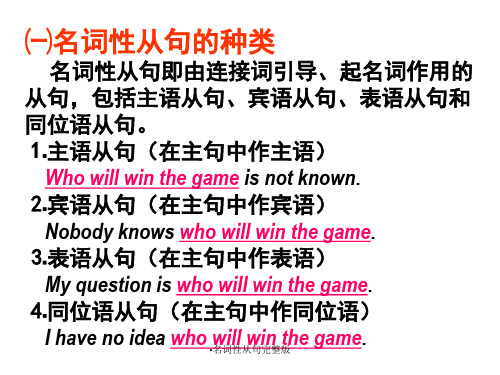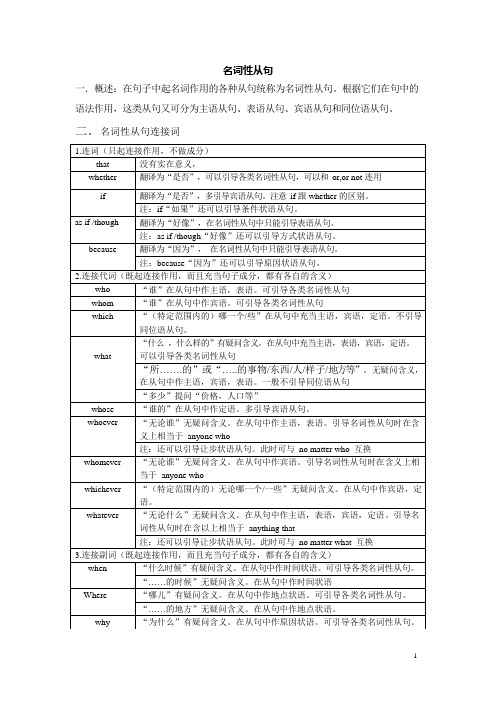3:名词性从句 16开
名词性从句课件 (3)

名词性从句课件一、名词性从句概述名词性从句是指在句中充当名词的从句,可以用来作主语、宾语、表语、同位语等。
名词性从句在句子中起到连接句子成分的作用,使句子更加丰富多样,表达更加准确清晰。
名词性从句可以分为以下几种类型:1.主语从句:在句中作主语的从句。
2.宾语从句:在句中作宾语的从句。
3.表语从句:在句中作表语的从句。
4.同位语从句:在句中作同位语的从句。
二、主语从句主语从句在句中作主语,常常以it作形式主语,将实际的主语从句放在句子后面。
1. 主语从句的引导词常用的主语从句引导词有:•Who:谁•What:什么•Where:哪里•When:什么时候•Whether:是否2. 主语从句的例句下面是一些主语从句的例句:•What you said is true.(你说的是真的。
)•Where he went is still a mystery.(他去哪里仍然是一个谜。
)•Whether he will come or not is uncertain.(他是否会来还不确定。
)三、宾语从句宾语从句在句中作宾语,常常出现在某些动词、形容词或介词后面。
1. 宾语从句的引导词常用的宾语从句引导词有:•That:引导陈述句类宾语从句•Whether/If:引导陈述句类宾语从句或疑问句类宾语从句•Wh-:引导疑问句类宾语从句2. 宾语从句的例句下面是一些宾语从句的例句:•He said that he would come tomorrow.(他说他明天会来。
)•I wonder if/whether the train has arrived.(我想知道火车是否已经到站。
)•She asked me what my favorite color is.(她问我最喜欢的颜色是什么。
)四、表语从句表语从句在句中作表语,常常出现在系动词后面,用来说明主语的身份、性质、特征等。
1. 表语从句的引导词常用的表语从句引导词有:•That:引导陈述句类表语从句•Whether/If:引导陈述句类表语从句或疑问句类表语从句•Wh-:引导疑问句类表语从句2. 表语从句的例句下面是一些表语从句的例句:•The fact is that he is the winner.(事实是他是赢家。
名词性从句完整版经典实用

(2)It +be+形容词 (necessary/natural/wonderful/likely/strange/important/certain等 )+that从句
eg.It is wonderful that all of you have passed the difficult exam.
•名词性从句完整版
•13
误:If Mary really heard him is really doubtful. 正:Whether Mary really heard him is really doubtful. 正:It was doubtful if /whether Mary really heard him.
•名词性从句完整版
⒈连词:引导从句但不作任何成分。
⑴that—没有意义,引导主/宾/表/同位语从句。 ①It is said that there will be a party tonight. ②They say (that) there will be a party tonight. ③Why he failed was that he made a vital mistake. ④The key that he succeeded lied in his hard work. ⑵if—是否,引导宾语从句,主语从句。
2 It was a pity that you failed in the exam.
•名词性从句完整版
用it 作形式主语的结构
• It+be+名词(短语)(a pity/a shame/a surprise/no wonder等)+ that从句
ห้องสมุดไป่ตู้
eg. It is a pity that you have missed the wonderful lecture.
名词性从句讲义 完整版!

名词性从句一,名词性从句的概念:1, 相当于名词,分为主语从句、表语从句、宾语从句和同位语从句2,名词性从句的引导词:that, whether, if (一般是宾语从句),as if(表语从句),who, whom, whose, what, which, when, where, why, how,以及由how组成的词组,如:how many, how long, how far两组需要注意的连接词that/what1)that和what都可以引导名词性从句,但that是连接词,本身无词义,仅起连接作用,不在从句中担任任何成份;what是连接代词,不仅引导名词性从句,而且在从句中充当一定的成份,如主语、宾语或表语。
e.g: That he stole a bike was true.The important thing is what you do, but not what you say.高考真题:_______ we can't get seems better than _______ we have.A. What; whatB. What; thatC. That; thatD. That; what2)whether和if均可引导动词后的宾语从句,常可互换。
a.在介词后面只能用whether,不能用if。
例如:①This depends upon whether we are determined to do it.b.在动词不定式之前,只能用whether,不能用if。
例如:①He doesn't know whether to stay or not.c.引导主语从句,表语从句,同位语从句时只能用whether。
例如:①It is unknown whether he will come. 他是否来还不知道。
②The question is whether they can take our advice.3.The question whether he'll come is unknown.3)doubt用于肯定结构时,后面用whether/ if引导名词性从句;用于否定结构或疑问结构时,后面用that引导名词性从句。
名词性从句ppt

名词性从句1. 什么是名词性从句名词性从句是指在句子中充当名词的从句。
它可以作主语、宾语、表语、同位语等成分,起着名词的作用。
名词性从句通常由连接词引导,常见的引导词有:that、whether、if、who、whom、whose、which、what等。
2. 名词性从句的类型名词性从句有三种类型:主语从句、宾语从句和同位语从句。
2.1 主语从句主语从句是指在句子中作主语的名词性从句。
它通常由连接词“that”引导,也可以由连接词“whether/if”引导。
主语从句在句子中起到主语的作用,常见的句型有:•That he is late is a problem.(他迟到是个问题。
)•Whether/if it will rain tomorrow is uncertain.(明天是否会下雨还不确定。
)2.2 宾语从句宾语从句是指在句子中作宾语的名词性从句。
它通常由连接词“that”引导,宾语从句常见的动词有:believe、think、know、hope、wonder、ask等。
宾语从句在句子中起到宾语的作用,常见的句型有:•I believe that he is telling the truth.(我相信他在说真话。
)•She asked me if I could help her.(她问我是否能帮她。
)2.3 同位语从句同位语从句是指在句子中作同位语的名词性从句。
它通常由连接词“that”引导,同位语从句一般紧跟在名词之后,用来解释说明该名词的内容。
常见的句型有:•The news that he won the prize is exciting.(他获奖的消息令人激动。
)•I have no idea that he is coming.(我不知道他要来。
)3. 名词性从句的注意事项在使用名词性从句时,需要注意以下几点:•引导词的选择:根据具体语境选择合适的引导词,如主语从句通常使用“that”;宾语从句中的直接引语常用“that”,间接引语用“whether/if”。
必修三《名词性从句》课件(共26张PPT)

7. My suggestion is ______ we should
turn the land into rice fields.
A. what
C. which
B. that
D. where
8. His proposal is that the dam ______
at the foot of the mountain.
{
同位语 I don’t know about the fact that he is a teacher
{
I don’t know about the man, Mr. White.
Fan Bingbing and Lichen are dating.
The big news makes their fans surprised That Fan Bingbing and Lichen are
Practice time
二、名词性从句的写法 名词性从句是学生在写作中喜欢尝试的 复杂句,在写作时可采用“三步法”:
[示例]
第一步:写出两个简单句。
①He said a lot at the meeting.
②His words were very attractive.
第二步:让句①作主语从句,可转换为“他在会上所说的话”,即what he said at the meeting。 第三步:把句①转换的主语从句和句②连在一起。 What he said at the meeting was very attractive.
[即时演练] 把下列每组题中的两个简单句合并为一个含有名词性从句的复合句 1.When did you enter the room? The police wants to know it. ____________________________________________________________________
名词性从句-完整版PPT课件精选全文

3. 连接副词:when(=the time when什么时候,何时),where(=the place where什么地方,何地),how(=the way that/in which怎样, 以……方式,如何),why=the reason why为什么)。它们除起连 接作用,还在从句中作状语。
3) wh类连接词引导的主语从句: wh类连接词包括wh类的连接代词(who, whom,
whose, which, what, whoever, whomever, whichever, whatever等)和连接副词(when,
where, how, why, whenever, wherever, however 等)。what, when和wh-ever类的词有时可不表 疑问。wh类连接代词在句中既起连接作用, 又可充当主语、宾语、表语、定语等成分。 wh类连接副词在句中起连接作用,在从句中 可充当时间、地点、原因、方式状语。
【温馨提示】 ①whether/ if引导宾语从句表示“是否”
的意思时,一般情况下可互换。 ②if引导宾语从句时可以有否定式,而
whether从句则没有。 e.g. I don’t care if he doesn’t come.
5) 特殊疑问词引导的宾语从句: 由who, what, how, which, whose, where, why等词引导的宾语从句,可作动词、 介词及形容词的宾语。
【温馨提示】 doubt, doubtful与sure后名词性从句连接词 that, whether, if的选择。 ①当doubt, doubtful用于肯定句时,后面的名
词性从句的连接词常用whether或if;当 doubt, doubtful用于否定句或疑问句时,后 面名词性从句的连接词用that。
名词性从句(可编辑修改word版)

名词性从句一.概述:在句子中起名词作用的各种从句统称为名词性从句。
根据它们在句中的语法作用,这类从句又可分为主语从句、表语从句、宾语从句和同位语从句。
二.名词性从句连接词四.if, whether 的区别1.引导主语从句时,如果主语从句放在句首,只能用whether 不能用if 引导,但是如果用it 做形式主语,而把主语从句放在句末时,也可以用if 引导.2.引导宾语从句时常放在动词know, ask, care, wonder 之后,if 和whether 均可。
少数动词,如: leave, put, discuss, doubt 后的宾语从句常用whether.。
3.在介词后面的宾语从句中,在表语从句、同位语从句中,表“是否”,只能用whether;4.w hether 和if 都可以和or not 连用,但是whether 之后可以直接跟or not,而if 不可以。
I don’t know whether or not I will stay.(只能用whether)5.在不定式前只能用whether.如:I can’t decide whether to stay. 我不能决定是否留下。
五.与“命令、要求、建议”等相关的名词性从句中通常用虚拟语气,虚拟语气的构成是“should+动词原形”或省去should,直接用动词原形。
六.名词性从句以考查引导词为主,同时考查时态,语序,与其它从句的区别以及混同虚拟语气的考查。
一.主语从句1.主语从句定义:在复合句中充当主语的句子叫做主语从句。
That he will succeed is certain.Whether wild life can be well protected is of great importance.Who will go makes no different.Which kind of food is the best is still not certain.What is needed for the space trip is careful preparation.Whoever comes is welcome.How we can help the twins will be discussed at the meeting.When they’ll start the project has not been decided yet.Where he hid the money is to be found out.Why dinosaurs died out remains a puzzle.2.主语从句引导词按照在句中是否做成分主要分为三类:连词that、whether、if 连接代词、连接副词。
英语名词性从句讲解【完整版】

2、I asked him if he could do me a favor .
If与whether的区别:
1、If不能引导放于句首的主语从句,而whether可以。 2、引导表语从句用whether,不用if。 3、引导同位语从句用whether,不用if。 4、whether可以引导从句作介词的宾语,不用if 。 5、whether or not 连在一起可以,但if不可以。而 “whether-----or not = if -----or not”
同位语从句:
定义:在复合句中充当同位语的句子。 同位语从句用来对其前面的抽象名词进行解释说明,被解释说明的词和 同位语在逻辑上是主表关系。 同位语常见名词:fact, suggestion, advice, idea, decision, news, thought, hope, belief, truth, doubt, promise, possibility, truth, warning, message, reason, report, question,explanation, wish, problem等。 常见的连接词:that, whether, what, who, how, when, where等。 用法: The thought that I want to buy my mother a birthday gift makes me excited.that 引导的同位语从句,解释说明 thought,从句不缺成 分 There is some doubt whether he will come. whether 引导同位语从句,if 不能引导同位语从句 we haven’t made the decision where we are going to spend our vacation. 有时同位语从句可以不紧跟解释说明的名词后面。 The news is surprising that he won the match.
名词性从句PPT课件

语态:被动语态和主动语态
被动语态
表示动作的接受者是主语,如 "The book was written by him."中的主语从句"The book was written"使用被动语态。
主动语态
表示动作的执行者是主语,如 "He wrote the book."中的主语 从句"He wrote the book"使用 主动语态。
抽象名词翻译
在汉译英时,有时需要将具体 名词抽象化,以使译文更加符
合英语表达习惯。
THANKS FOR WATCHING
感谢您的观看
04 名词性从句的特殊结构
it作形式主语
形式主语用于代替主 语从句,避免句子结 构不平衡。
It is important that we should learn English well.
It is+形容词/名词 +that+主语从句。
强调句型中的名词性从句
01
It
is/was+被强调部分
+that/who+句子其余部分。
表示现在的动作或状态,如"I know who he is."中的宾语 从句"who he is"使用现在时态。
过去时态
表示过去的动作或状态,如"He said that he was a student."中的宾语从句"he was a student"使用过去时态。
将来时态
表示将来的动作或状态,如"I will tell you what will happen."中的宾语从句"what will happen"使用将来时态。
语法复习三:名词性从句+16开

三,选择填空: 1. Do you see _____ I mean? A. that B./ C. how D. what
2. Tell me_____ is on your mind. A. that B. what C. which D. why
3. We must stick to _____ we have agreed on. A. whatB. that whatB. 4. Let me see _____. A. that can I repair the radio C. I can repair the radio 5. Keep in mind _____. A. that the teacher said C. that did the teacher say
语法复习三:名词性从句 语法复习三:
名词性从句相当于名词,可分别作主句的主语,表语,宾语和同位 语.因此,名词性从句厅分为主语从句,表语从句,宾语从句和同位从 句. (一)引导名词性从句的连接词 1,连接代词:who, whose, whom, what, which.有词义,在从句中 担任成分,如主语,表语,宾语,或定语等. 2,连接副词:when, where, why, how.有词义,在从句中担任成\ 分,作状语. 3,连接词:that, whether, if, as if.that 无词义,在从句中不 担任成分,有时可省略;if (whether), as if虽有词 义,但在从句中不担任成分.
一,判断下列各句哪句含有名词性从句,并指出是什么从句: 1. China is no longer what it used to be.
表语从句 同位语从句
2. The truth that the earth turn around the sun is known to all. 3. It was snowing when he arrived at the station.
名词性从句优秀PPT课件

解析
A选项中“What”引导的是主语 从句,表示“他说的话不是真实 的”。B选项中“Who”引导的 是主语从句,表示“谁将去参加 会议还不知道”。C选项中 “Why”引导的是主语从句,表 示“他为什么离开学校还是一个 谜”。
THANKS
感谢观看
whom的用法
引导定语从句,相当于“whom”
引导名词性从句,相当于“who”
whose的用法
引导定语从句,表示“谁的”
引导名词性从句,表示“谁的”
which的用法
01
引导定语从句,相当于 “which”
02
引导名词性从句,相当于 “which”
03
名词性从句的时态与语序
时态的用法
一般现在时
A选项中“It is strange that…”是一个固定句型, 表示“奇怪的是…”,其中 that引导的从句是主语从句 。B选项中“It is a pity that…”也是一个固定句型 ,表示“遗憾的是…”,其 中that引导的从句是主语从 句。C选项中“where”引 导的是地点状语从句,表示 “在哪里”。
解决方案
在编写或修改名词性从句时,要特别注意主谓一致的问题,确保主语和谓语在 单复数形式上保持一致。
从句中的时态错误
时态不一致
在描述过去、现在或未来的事件时,时态的使用是关键。例 如,“If I was younger, I would do it”中,“was”与 “would do”之间存在时态不一致的错误。
用于表达过去某个时间正 在进行的动作。
时态的用法
过去完成时
用于表达过去的过去,即过去某个时 间之前发生的动作或状态。
过去完成进行时
用于表达过去的过去,即过去某个时 间之前正在进行的动作。
《名词性从句》课件

表示正在进行的动作或存在的状态。例如:They are knowing (that) he is studying.
现在完成时
表示过去的动作对现在的影响或结果。例如:He has known (that) she has left.
语态的用法
主动语态
表示主语执行的动作。例如:We found (that) he was studying.
不管什么样的”。
特点
what引导的名词性从句相当于一 个特殊疑问句。
使用场景
what常用于引导主语从句、宾语从 句和表语从句。
which的用法
定义
which用作连词时,引导名词性 从句,表示选择关系。
特点
which在从句中充当主语、宾语 或定语,表示选择范围。
使用场景
常用于引导宾语从句和定语从句 ,表示选择关系。
特点
具有名词的语法功能,同 时又保留了从句的句法结 构。
类型
主语从句、宾语从句、表 语从句和同位语从句。
名词性从句的种类
主ห้องสมุดไป่ตู้从句
在复合句中充当主语的 从句,通常放在句首。
宾语从句
在复合句中充当宾语的 从句,通常放在动词或
介词后。
表语从句
在复合句中充当表语的 从句,通常放在系动词
后。
同位语从句
在复合句中充当同位语 的从句,通常放在名词 后,对名词进行补充说
名词性从句的引导词
what、which、who/whom、whose等。
定语从句的引导词
that、which、who/whom、whose等。
从句在句子中的位置
名词性从句
可以位于句首、句中或句尾。
(完整word版)高考英语名词性从句专题复习(讲解+练习)

专题三名词性从句名词性从句指在复合句中起名词作用的从句,它在句子中可作主语、宾语、表语或同位语。
名词性从句既是中学英语教课的要点,也是高考考察的热门。
一、名词性从句的分类名词性从句包含主语从句、宾语从句、表语从句和同位语从句。
其连结词有 that, if, whether;连结代词 who, what, which;连结副词 when, where, how, why 等。
考察热门一:对主语从句的考察主语从句在复合句中充任主语,它能够放在主句谓语动词以前。
但为了保持句子均衡,多半状况下可用it 作形式主语,而把主语从句置于句尾。
考察热门二:对宾语从句的考察宾语从句在句子中作及物动词或介词的宾语。
假如主句的谓语动词是及物动 make, find, see, think 等,则把宾语从句置于宾语补足语以后,用it 作形式宾语。
此外,某些作表语的形容词,如 sure, happy, glad, certain 等以后也能够带宾语从句。
考察热门三:对表语从句的考察表语从句在句子中作表语,位于主句中的系动词以后。
考察热门四:对同位语从句的考察同位语从句一般跟在某些抽象名词以后,进一步说明该名词所表示的详细内容。
可跟同位语从句的名词主要有:fact, idea, news, promise, belief, condition, doubt, fear, hope, problem, proof, question, reply, report, suggestion, thought, truth等。
二、对名词性从句的考察应注意以下几点:考察热门五:考察名词性从句的语序和主从句时态名词性从句均应用陈说句语序,其时态要保持主从句时态一致性。
考察热门六:从语境和句子构造需要出发,选择适合的连词(I)连词that 和what:that 无实质意义,在从句中不充任任何成分,只起连结主从句的作用;如 that 指引宾语从句,常可省略;如指引主语从句、表语从句或同位语从句, that 不可以省略。
名词性从句公开课课件

汇报人: 202X-12-21
目录
• 名词性从句概述 • 名词性从句的分类 • 名词性从句的引导词 • 名词性从句的特殊用法 • 名词性从句的常见错误 • 名词性从句的实际应用
01
名词性从句概述
定义与类型
定义
名词性从句是句子作为名词在句 子中充当成分,具有名词的功能 。
类型
01
as if表示“好像,似乎”,用于引导方式状语从句。
结构
02
主语 + 行为动词 + as if + 从句
例子
03
He talked as if he were a doctor.
05
名词性从句的常见错误
从句与主句的逻辑关系错误
总结词
逻辑关系错误
详细描述
在使用名词性从句时,从句与主句之间的逻辑关系常常会出现错误。例如,从 句的意思与主句的意思不一致,或者从句中的信息与主句中的信息存在矛盾。
引导词
引导同位语从句的词有that, whether, who, whose, which, what等。
例子
The news that we won the game is exciting.
03
名词性从句的引导词
that的用法
引导主语从句、表语 从句和同位语从句
通常不省略,但有时 可以省略
在从句中不充当任何 成分,只起连接作用
从句引导词使用不当
总结词
引导词使用不当
详细描述
名词性从句的引导词使用不当是常见的错误之一。例如,应该使用“that”引导 的从句,却错误地使用了“which”;或者应该使用“whether”引导的从句, 却错误地使用了“that”。
名词性从句讲解课件

特点
which在从句中担任成分 ,通常表示“哪个”、“ 哪些”。
例子
I don't know which book you like best. (我 用法
定义
例子
whose是一个限定词,用于引导名词 性从句,表示某个对象的所属关系。
I don't know whose book this is. ( 我不知道这是谁的书。)
分类
01
02
03
04
主语从句
在句子中充当主语的名词性从 句,通常放在句子的开头。
宾语从句
在句子中充当宾语的名词性从 句,通常放在动词或介词之后
。
表语从句
在句子中充当表语的名词性从 句,通常放在系动词之后。
同位语从句
在句子中充当同位语的名词性 从句,通常放在名词之后,对
名词进行补充说明。
02 名词性从句的引导词
总结词
在名词性从句中,从句与主句的逻辑关系经常处理不当。
详细描述
应仔细分析从句与主句之间的逻辑关系,确保从句的内容与 主句的内容相符合,避免出现逻辑上的矛盾或混乱。
感谢您的观看
THANKS
定义
why是一个副词,用于引导名词性从句,表示某 个原因或动机。
特点
why在从句中担任成分,通常表示“为什么”、 “因为什么”。
3
例子
I don't know why he left early. (我不知道他为 什么提前离开了。)
03 名词性从句的时态和语态
时态:现在时、过去时、将来时
现在时
表示现在或将来某个时间点发生的动作或存在的 状态。
强调句型
总结词
突出强调某个成分
名词性从句教学课件

My friend who live in New York is coming to visit us.(主语是单数形式,但谓语动词使用了复 数形式。)
详细描述
在名词性从句中,主语和谓语的一致性是语法规 则之一。如果主语是单数形式,谓语动词也应该 使用单数形式;如果主语是复数形式,谓语动词 则应使用复数形式。
详细描述
在名词性从句中,时态的选择应与主句的时态保持一致, 同时要注意语序的正确性。
错误示例
He said that he has finished his homework.(从句的 时态与主句不一致。)
正确示例
He said that he had finished his homework.(从句时 态与主句保持一致。)
增强句子表达能力
名词性从句能够增强复合 句的表达能力和丰富度, 使句子更加复杂和具体。
连接句子和段落
名词性从句在文章中可以 起到连接句子和段落的作 用,使文章更加连贯和有 逻辑性。
02
名词性从句的引导词
that引导的名词性从句
定义
that引导的名词性从句是用来 修饰主句中的名词,相当于名 词,可以在句中担任主语、宾
I like coffee, which I drink every morning.(从句与主句 的连接不够流畅。)
I like coffee that I drink every morning.(使用“that”引导 从句,使从句与主句更加连贯。 )
从句中的时态和语序错误
总结词
从句中的时态和语序是常见的错误,需要注意。
引导词位置
通常放在主句和从句之间,有时也可放在句末。
03
名词性从句的时态和语 序
名词性从句教学辅导课件

本课件将深入浅出地介绍名词性从句的定义、功能、引导词、语序等知识点, 并练习名词性从句的应用,帮助您掌握名词性从句。
什么是名词性从句?
名词性从句的定义
名词性从句是以一个从句作为主干句一部分的句子,而在主体句中扮演一个名词的角色。
名词性从句与其他从句的区别
名词性从句和其他从句不同,因为它在句中扮演名词的角色,而不是形容词、副词或者动词 等。
本节内容将介绍名词性从句的常考考点,对于学生 备考具有重要指导意义。
总结
名词性从句知识点复习
在本课中,您学习了名词性从句的各种知识点,加深了对名词性从句的理解和掌握。
名词性从句的重要性及应用价值
名词性从句是英语中最为常见的一种从句,掌握名词性从句对于人们学习和掌握英语语言具 有重要意义。
参考资料
名词性从句通常是作为主体句中的名词部分,从句的倒装结构
当名词性从句放在主体句的前面,语序可能发生倒装。
名词性从句的练习
名词性从句的练习题及解析
通过练习题,学生可以更好地掌握名词性从句的使 用方法,我们提供详细的解析,帮助学生掌握相关 知识点。
名词性从句的常考考点
名词性从句的分类
主语从句、宾语从句、表语从句和同位语从句。
名词性从句的功能
名词性从句作主语
名词性从句可以作为句子的主语,起到对主体句进 行解释的作用。
名词性从句作宾语
名词性从句可以作为一个复合句中的宾语。
名词性从句作表语
名词性从句可以作为句子的表语。
名词性从句作同位语
名词性从句可以用来对名词进行解释,并进一步说 明其意义。
课程参考书目
本课程的参考书目汇总了多篇关于名词性从句的优 秀学术论文和教材,供读者参考。
名词性从句pptx

05
名词性从句与其他从句的辨 析
名词性从句与定语从句的区别
1
名词性从句是起名词的作用,在句中担任主语 、宾语、表语等成分;而定语从句是起形容词 的作用,在句中担任定语成分。
2
名词性从句是一个完整的句子,没有逗号分隔 ;而定语从句是一个短语,有逗号分隔。
3
名词性从句没有先行词,而定语从句有先行词 。
省略情况
“the way”引导的名词性从句中可以省略主语和动词。
03
名词性从句的语义功能
提供信息
提供具体信息 描述具体事物
阐述具体观点
表达态度
表达肯定的态度
表达中立的态度
表达否定的态度
表达情感
表达积极的情感 表达消极的情感
表达中性的情感
04
名词性从句的运用场景
日常交流
总结词
频繁、随意、流畅性
省略情况
在某些情况下,whether可以省略。
由wh-词引导的名词性从句
wh-词
由where、when、why、 how等wh-词引导的名词性从
句。
疑问句语序
由wh-词引导的名词性从句采用 疑问句语序。
不可省略
与that和whether不同,wh-词引 导的名词性从句中的连接词不可省 略。
由as引导的名词性从句
顺序翻译
在很多情况下,名词性从句是在句子的前面或者后面,这时 应该根据句子的意思确定其位置。
意译法
调整句子结构
有些名词性从句在翻译时需要调整句子的结构,把从句翻译成主语、宾语、 定语等成分。
运用增减词
在翻译时可以适当增加或者减少一些词语,以便更准确地表达原句的意思。
增译法
增加主语
- 1、下载文档前请自行甄别文档内容的完整性,平台不提供额外的编辑、内容补充、找答案等附加服务。
- 2、"仅部分预览"的文档,不可在线预览部分如存在完整性等问题,可反馈申请退款(可完整预览的文档不适用该条件!)。
- 3、如文档侵犯您的权益,请联系客服反馈,我们会尽快为您处理(人工客服工作时间:9:00-18:30)。
名词性从句名词性从句相当于名词,可分别作主句的主语、表语、宾语和同位语。
因此,名词性从句可分为主语从句、表语从句、宾语从句和同位从句。
(一)引导名词性从句的连接词1、连接代词:who, whose, whom, what, which。
有词义,在从句中担任成分,如主语、表语、宾语、或定语等。
2、连接副词:when, where, why, how。
有词义,在从句中担任成分,作状语。
3、连接词:that, whether, if, as if。
that 无词义,在从句中不担任成分,有时可省略;if (whether), as if虽有词义,但在从句中不担任成分。
注意:连接代词与连接副词在句中不再是疑问句,因而从句中谓语不用疑问式。
连接代词与连接副词在从句充当句子成分,连接词whether 和if(是否),as if(好象)在从句中不充当句子成分,只起连接作用。
根据句义,如果连接代词与连接副词,whether、if 和as if都用不上时,才用that作连接词(that本身无任何含义)。
(二)主语从句1、主语从句在复合句作主语。
e.g. Who will go is not important.2、用it作形式主语,主语从句放在句末。
e.g. It doesn’t matter so much whether you will come or not.3、that引导主语从句时,不能省略。
e.g. That he suddenly fell ill last week made us surprised.(三)表语从句1、表语从句在复合句中作表语,位于系动词之后。
e.g. The question was who could go there.2、引导表语从句的连接词that有时可省去。
e.g. My idea is (that) we can get more comrades to help in the work.(四)宾语从句1、宾语从句在复合句中作宾语。
引导宾语从句的连词that一般可省略。
e.g. I hope (that) everything is all right.2、介词之后的宾语从句,不可用which或if连接,要分别用what或whether。
e.g. I’m interested in whether you’ve finished the work..I’m interested in what you’ve said.3、whether与if都可以引导宾语从句,常可互换。
但下面情况不能互换。
①宾语从句是否定句时,只用if,不用whether。
e.g. I wonder if it doesn’t rain.②用if 会引起误解,就要用whether。
e.g. Please let me know whether you want to go.(此句如果把whether改成if,容易当成条件句理解)③宾语从句中的whether 与or not直接连用,就不能换成if;不直接连用,可换。
e.g. I don’t know whether or not the report is true.I don’t know whether/ if the report is true or not.④介词后的宾语从句要用whether引导。
whether 可与不定式连用。
whether也可引导主语从句、表语从句、同位语从句,还可引导让步状语从句,以上均不能换成if。
但引导条件从句时,只能用if,而不能用whether。
e.g. It depends on whether we have enough time.They don’t know whether to go there.Please come to see me if you have time.(五)同位语从句同位语从句在句中作某一名词的同位语,一般位于该名词(如:news, fact, idea, suggestion, promise等)之后,说明该名词的具体内容。
e.g. I have no idea when he will be back.The fact that he had not said anything surprised everybody.练习:名词性从句一、判断下列各句哪句含有名词性从句,并指出是什么从句:1. China is no longer what it used to be.2. The truth that the earth turn around the sun is known to all.3. It was snowing when he arrived at the station.4. How he persuaded the manager to change the plan is interesting to us all.5. The news that they had won the game soon spread over the whole school.6. The news that you told me yesterday was really disappointing.7. That is where Lu Xun used to live.8. He spoke as if he understood what he was talking about.9. Do you remember the teacher who taught us English at middle school?10. I wonder why she refused my invitation.二、用适当的连词填空:1. I can’t decide ____________ dictionary I should buy.2. That’s ____________ he refused my invitation.3. I am very interested in ____________ he has improved his pronunciation in such a short time.4. ____________ we need is more time.5. The fact ____________ she had not said anything at the meeting surprised everybody.6. ____________ and ____________ they will meet has not been decided yet.7. Please tell me ____________ you are waiting for.8. Is that ____________ you are looking for?9. Would you please tell me ____________ the nearest post office is?10. I don’t know ____________ he will agree to the plan or not.三、选择填空:1. Do you see _____ I mean?A. thatB./C. howD. what2. Tell me_____ is on your mind.A. thatB. whatC. whichD. why3. We must stick to _____ we have agreed on.A. whatB. thatC. /D. how4. Let me see _____.A. that can I repair the radioB. whether -I can repair the radioC. I can repair the radioD. whether can I repair the radio5. Keep in mind _____.A. that the teacher saidB. what did the teacher sayC. that did the teacher sayD. what the teacher said6. Could you advise me _____?A. which book should I read firstB. what book should I read firstC. that book 1 should read firstD. which book I should read first7. He was criticized for _____.A. he had done itB. what he had doneC. what had he doneD. that he had done it8. Would you kindly tell me _____?A. how can I get to the Beijing Railway StationB. how I can get to the Beijing Railway StationC. where can I get to the Beijing Railway StationD. whether can I get to the Beijing Railway Station9. Mrs. Smith was very much impressed by _____.A. what had she seen in ChinaB. that she had seen in ChinaC. what she had seen in ChinaD. which had she seen in China10. We took it for granted ___A. that they were not comingB. that were they not comingC. they were coming notD. were they not coining11. I really don't know _____A. I should do nextB. what should I do nextC. what I should do nextD. how I should do next12. I'm afraid _____.A. the little girl will have to be operated onB. that will the little girl have to operate onC. the little girl will have to operate onD. that will the little girl have to be operated on13. She walked up to _____ .A. where did I standB. where I stoodC. I stood thereD. where I stood there14. Can you tell me _____?A. who is that gentlemanB. that gentleman is whoC. who that gentleman isD. whom .is that gentleman15. We'll give you _____.A. that do you needB. what do you needC. whatever you needD. whether do you need16. They want us to know _____ to help us.A. what can theyB. what they canC. how they canD. how can they17. We must put _____ into practice.A. what we have learnedB. that we have learnedC. that have we learnedD. what have we learned18. Did she say anything about _____?A. that the work was to be doneB. how was the work to be doneC. that was the work to be doneD. how the work was to be done19. He was never satisfied with _____.A. what she had achievedB. had what she achievedC. she had achievedD. that she achieved20. These photographs will show you _____.A. what does our village look likeB. what our village looks likeC. how does our village look likeD. how our village looks like21. Peter insisted _____ he pay the bill.A. on thatB. whatC. thatD. on which22. They urged _____ the library open during the vacation.A. whenB. whereC. whyD. that23. We wish we could have learned _____ when we were at high school.A. what you didB. that you had doneC. that what you didD. what did you do24.1 will describe to you _____ I saw when there.A. whatB. thatC. whichD./25. From _____ I should say he is a good worker.A. what 1 know of himB. that I do know of himC. what do I know of himD. that do I know of him26. I will give this dictionary to __ wants to have it.A. whomeverB. anyoneC. whoeverD. someone27._____ they will come here hasn' t been decided yet.A. WhatB. ThatC. WhenD. Where28. _____ was said here must be kept secret.A. WhoB. The thingC. WhateverD. Where29. It is still a question _____ we shall have our sports meet.A. ifB. thatC. whatD. when30. I'm going anyway. _____ she will go is up to her to decide.A. If or notB. Whether or notC. IfD. That31. It is strange _____ she have left without saying a word.A. thatB. whatC. whyD. how32. It is very clear _____ our policy is a correct one.A. whatB. thatC. whyD. where33. _____ Mr Zhang said is quite right.A. ThatB. WhenC. WhatD. Whether34. It has been decided _____ he will be sent there.A. ifB. whetherC. whyD. that35. It doesn' t matter _____he' s come back or not.A. ifB. whetherC. thatD. when36. It's a great pity _____ we won’t be able to finish the task on time.A. whenB. thatC. whyD. where37. It happened _____ I wasn't there that day.A. whenB. whyC. whereD. that38._____ you have done might do harm to other people.A. WhatB. ThatC. WhichD. The things39. _____ leaves the room last ought to turn oft the lights.A. AnyoneB. The personC. WhoeverD.Who40._____ the 2000 Olympic Games won't be held in Beijing is known to all.A. WhetherB. IfC. WheneverD. That41. _____ fails to see this will make a big mistake.A. ThatB. WhoeverC. WhetherD. Whether or not42. __ we need more equipment is quite obvious.A. WhatB. WhetherC. ThatD. Whatever43. Has it been announced _____?A. when are the planes to take offB. that are the planes to take offC. where are the planes to take offD. when the planes are to take off44. That is _____ we all support his idea.A. whatB. whyC. whereD. when45. That’s _____ we should do.A. thatB. whatC. howD. why46. _____ is troubling me is _____ I don’t understand _____ he saidA. What; that; whatB. What; what; whatC. That; that; whatD. Why; that; which47. Things were not _____ they seemed to be.A. whenB. whyC. thatD. what48. That’s _____ I want to say.A. all whatB. whatC. all whichD. what that49. That’s _____ .A. where our differences lieB. our differences lie thereC. where do our differences lieD. that where our differences lie50. That is _____ .A. where lived he thereB. where did he liveC. where he livedD. that where he lived51. The questions is _____.A. whether is it worth doingB. that if it is worth doingC. whether it is worth doingD. if it is worth doing52. Water will continue to be _____ it is today next in importance to oxygen.A. howB. whichC. whatD. as53. That's_____.A. how did I become a teacherB. how I became a teacherC. how a teacher I becameD. that I became a teacher54. They are just _____.A. that what shall I haveB. what shall I haveC. that I shall have whatD. what I shall have55. It looked ____.A. as if it was going to rainB. that as if it was going to rainC. as if was it going to rainD. as if that it was going to rain56. That's_____.A. how she did itB. that how did she do it.C. how did she do itD. what she did it57. That is _____ we decided to put the discussion off.A. whereB. whichC. thatD. why58. Th at’s _____ I lived when I was ten years old.A. whereB. at whichC. there whereD. when59. My suggestion is _____ we should send a few comrades to help them.A. ifB. thatC. when thatD. that where60. The idea _____ all people are selfish is wrong.A. whatB. thatC. whyD. if61. We heard the news _____ our team had won.A. thatB. whatC. whetherD. why62. The fact _____ he hadn’t said anything surprised us all.A. whyB. ifC. thatD. whether63.I have no idea _____ she will be back.A. thatB. whereC. that whenD. when64. We must keep in mind the fact _____ China is still a developing country.A. whetherB. thatC. whyD. when65. They have no idea at all _____.A. where he has goneB. where did he goC. where has he goneD. which place he has gone。
